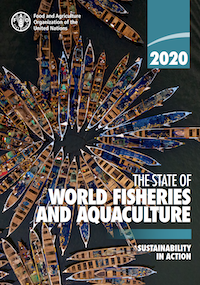The 2020 edition of The State of World Fisheries and Aquaculture has a particular focus on sustainability. This reflects a number of specific considerations. First, 2020 marks the twenty-fifth anniversary of the Code of Conduct for Responsible Fisheries (the Code). Second, several Sustainable Development Goal indicators mature in 2020. Third, FAO hosted the International Symposium on Fisheries Sustainability in late 2019, and fourth, 2020 sees the finalization of specific.
FAO guidelines on sustainable aquaculture growth, and on social sustainability along value chains. While Part 1 retains the format of previous editions, the structure of the rest of the publication has been revised. Part 2 opens with a special section marking the twenty-fifth anniversary of the Code.
It also focuses on issues coming to the fore, in particular, those related to Sustainable Development Goal 14 and its indicators for which FAO is the “custodian” agency. In addition, Part 2 covers various aspects of fisheries and aquaculture sustainability. The topics discussed range widely, from data and information systems to ocean pollution, product legality, user rights and climate change adaptation. Part 3 now forms the final part of the publication, covering projections and emerging issues such as new technologies and aquaculture biosecurity. It concludes by outlining steps towards a new vision for capture fisheries.
The State of World Fisheries and Aquaculture aims to provide objective, reliable and up-to-date information to a wide audience – policymakers, managers, scientists, stakeholders and indeed everyone interested in the fisheries and aquaculture sector.
About the series
The State of World Fisheries and Aquaculture (SOFIA) is the flagship publication of the FAO Fisheries and Aquaculture Department. This premier advocacy document is published every two years to provide policy-makers, civil society and those whose livelihoods depend on the sector a comprehensive, objective and global view of capture fisheries and aquaculture, including associated policy issue.



